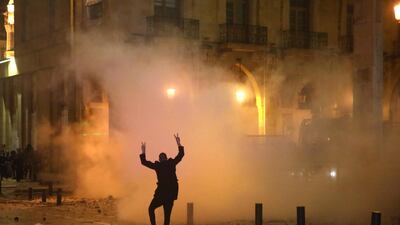The US government is calling on Lebanese security forces and demonstrators to refrain from violence and the authorities to protect the right to protest after weekend clashes.
Almost 500 people were injured in downtown Beirut at the weekend, the Lebanese Red Cross and Civil Defence said.
The security forces, faced with riots and anti-government rallies, used harsher measures such as rubber-coated bullets to disperse crowds from Parliament and government headquarters.
On Monday, security installed taller barricades and fences to block the demonstrators.
A US official called on “all sides to refrain from violence and for the authorities to protect the right to peaceful protest".
Washington is watching the situation closely and has been pushing, since the protests started in mid-October, for a government that would implement a comprehensive set of reforms that address corruption in the country.
"The test of any government will be its actions," a US official told The National.
"Lebanese leaders need to commit to and implement the reforms necessary to respond to the Lebanese people's demands for an end to endemic corruption, better governance and economic opportunity.
Prime Minister Saad Hariri resigned amid the protests on October 29 and his nominated successor, Hassan Diab, has so far failed to form a new cabinet.
Washington is now emphasising the need for an inclusive and credible government.
“A credible government is one that will act in the interests of all Lebanese and is broadly perceived by the Lebanese people as such, and is able to restore international confidence in Lebanon,” the official said.

That confidence is needed to unlock $11 billion (Dh40.4bn) in loan pledges for Lebanon, made at the Cedar donor conference in France last year.
The US official said there was “no route to international assistance other than through concrete reforms taken by a credible and capable government".
These reforms include addressing infrastructure and corruption problems in Lebanon’s electricity industry, providing public services and stopping smuggling through its ports.
Randa Slim, a director at the Middle East Institute, said the framework considered for a Diab government would not meet these requirements.
"The ongoing consultations for the Diab government suggest it is designed to meet the interests of the Aoun-Berri-Hezbollah axis," Ms Slim told The National.
“It will fail to meet the minimum criteria set forth by the protesters of a technocratic cabinet that charts a pathway to economic recovery.”
Mr Diab was nominated with limited Parliament majority through blocs led by President Michel Aoun and Speaker Nabih Berri, and those supporting Hezbollah.
Ms Slim said such a recovery would need an expert team, a workable plan, and political consensus on painful economic policies.
“None of these three elements are in place today,” she said.
Ms Slim was concerned about the direction in which the protests were heading.
“The latest violent turn taken by the protest movement does not bode well for its ability to move into a governance phase that can contest the ruling class in the political space,” she said.
But Faysal Itani, a deputy director at the Centre for Global Policy, said the stand-off could lead to economic collapse.
"There is no scenario in which the security forces would not turn violent in the face of an open-ended protest, and there is no scenario in which the protests would subside without a substantial political transformation," Mr Itani said.
He said the political elite would block a political transformation, making “the eventual economic collapse the ultimate decider".
The country is at risk of defaulting on its debt, and the Lebanese pound has depreciated by about 40 per cent since the crisis began in October.
Local reports have indicated this week that medicine and hospital supplies were starting to fall short, as fuel did in December.


